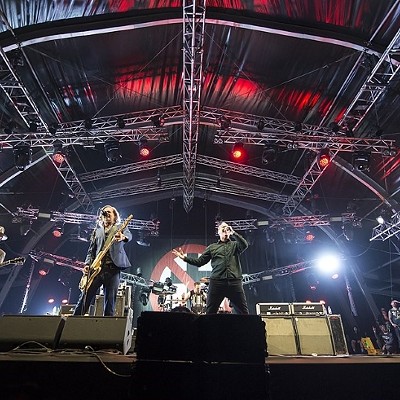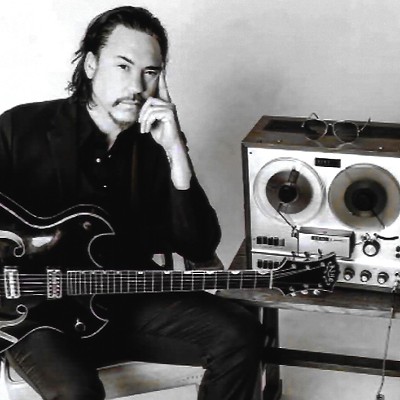Not Only Women Bleed: Vignettes from the Heart of a Rock Musician By Dick Wagner Desert Dreams Productions, LLC/Amazon.com, $9.99
While the name Dick Wagner may not be recognizable to the casual classic rock fan, deep trackers might know the singer/guitarist from his work fronting two popular Michigan-based acts in the '60s (The Bossmen and The Frost), efforts on stage and in the studio with Lou Reed, Aerosmith, KISS, Peter Gabriel, and even Tim Curry, and a solo career.
But Wagner is probably best known for his collaborations with Alice Cooper as his touring and studio lead guitarist during the latter half of the '70s. He also co-wrote with the master of shock rock many of his biggest hits ("I Love the Dead," "Welcome to My Nightmare," "Only Women Bleed," "You and Me").
The 68-year-old performer is now getting back on track performing, recording, and writing after surviving a near-fatal heart attack in 2007, and has recently penned a memoir, Not Only Women Bleed, available as an e-book).
The 68-year-old performer is now getting back on track performing, recording, and writing after surviving a near fatal heart attack in 2007, and has recently penned a memoir, Not Only Women Bleed (467 pp., $9.99, available as an e-book).
Rocks Off spoke with Wagner from his home studio, Desert Dreams, about his survival, why The Frost never broke out nationally, and his snake-handling/golf-loving buddy.
Rocks Off: First I have to ask, how is your health?
DW: Well, it's very good. I made a very strong comeback and am getting ready to tour in the spring and summertime. I barely picked up a guitar for five years. And I'm going to Italy in a few days to produce a band. So I feel good and I'm being active.
RO: You started your career at a time when there really were regional music scenes, and bands - like the Bossmen and the Frost - could be hugely successful with hit singles and radio play in one area and then maybe spread. Do you think we miss something by not really having that anymore?
DW: Oh, absolutely. Everyone looks to radio, and to build a local scene, you had to have local radio support and you could gather up a fan base. It was exciting. With the Bossmen, we got so tight with the guys at the radio stations that we'd go in and make up skits right there in the studio with the DJs.
We'd do advertising, rent the halls, and put on our own shows. But that's impossible to do anymore. I was 21 and full of energy and was able to do all these things, but it was a challenge going to the cities and [starting all over] each time. You need an organization to pull it off.
RO: So many great bands came out of Detroit and Michigan during that time - The Stooges, MC5, Ted Nugent, Bob Seger, Grand Funk Railroad - and it was a tougher sound. How much was the music influenced by the geography?
DW: I think it wasn't necessarily the geography but the social network. The kids all came from blue-collar families, and it was an industrial area. That's reflected in the sound. We'd have national acts and acts from England come in to places like the Grande Ballroom, and the Detroit bands would open and blow them away.
The fans and the bands were all blue collar, and we liked to drink and party and get loud and crazy. It created an intense [music scene] that eventually broke through. It took Bob Seger 10 years to break through nationally.
RO: Of all the projects you've been involved with, I personally like the Frost.
DW: I wished that we had signed with a different record company. The reason we signed with Vanguard was that Sam Chartres pursued us. He wined us and dined us every week and we fell for it. Looking back on the contract we signed, it was pitiful. I've never made a dime on the Frost. I still get statements from them where I'm still in the hole for $30,000!
The only money I made was from live appearances. We sold 50,000 records in Detroit the first month with that first album, but we never made any royalties. We'd make records and then they'd charge us in their own studio, plus give us a very low rate on our publishing royalties.
RO: That sounds incredible. But wasn't another reason because Vanguard was a folk and blues label and maybe didn't know what to do with a rock band?
DW: That's exactly right. They got it right in Detroit, but everywhere else we went to play, you couldn't find a Frost record anywhere. San Francisco, Canada, New England. We were very disappointed. They didn't follow our tours or support us in any way.
I mean, the radio commercials for the first Frost record were ridiculous! It was two Eskimos talking to each other about the Frost! Mrs. and Mrs. Ugamonk talking about the record. It was a great band with great potential.
RO: At what point did you realize that "Only Women Bleed" was more than just a song and kind of this Big Statement?
DW: Alice and I knew that in the beginning. I had written the music back in the late '60s during the Frost days, but the lyrics didn't fit. He had the bright idea of the title, and it took us about 25 minutes to finish the song. It was written as a statement about domestic violence. I contributed some lyrics, but Alice did most of it and he's the greatest.
And Bob Ezrin's production is fantastic. To date, I think about 25 different artists from Carmen McRae to Tina Turner to Lita Ford have done it. And the royalties from that one song have supported me a lot through the years.






